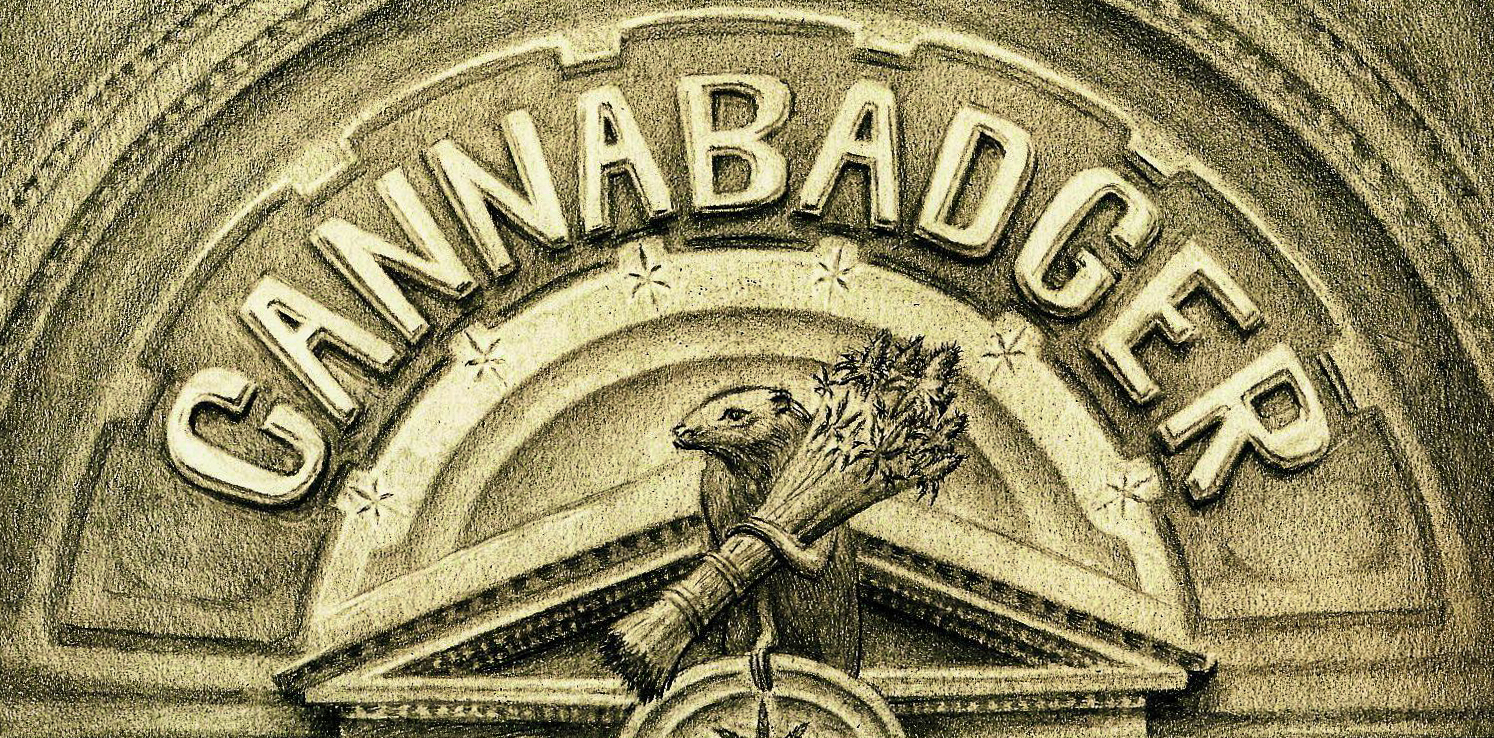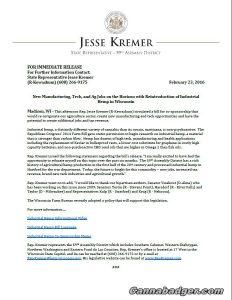UPDATED: 02/28/2017 – 10:43:41 AM Rep. Jesse Kremer (R-Kewaskum) announced Feb. 23 in a press release that he is circulating a cosponsorship memo for industrial hemp legislation LRB-1117/1. His release thanks the bill’s bipartisan group of authors, Senator Kathleen Vinehout (D-Alma) who he notes has been working on this issue since 2009 along with Senators Patrick Testin (R-Stevens Point), Sheila Harsdorf (R-River Falls) and Lena Taylor (D-Milwaukee) as well as Representatives Bob Kulp (R-Stratford) and Scott Krug (R-Nekoosa).
Analysis by the Legislative Reference Bureau
Current law places various restrictions on the possession, manufacture, and delivery of controlled substances. One such controlled substance is tetrahydrocannabinol (THC), including THC contained in or obtained from marijuana. The controlled substances law defines marijuana as all parts of plants of the genus Cannabis, whether growing or not, and most derivatives or preparations of the plants (though it does not include, for instance, fiber produced from the stalks or oil made from the seeds of the plants). THC is currently placed in the most restrictive category of controlled substances, which means it may not be prescribed for medical use and may be manufactured and possessed only for particular purposes (such as research) under special permits.
This bill requires the Department of Agriculture, Trade and Consumer Protection to issue licenses that authorize the growing and processing of industrial hemp. Industrial hemp is defined as the plant Cannabis sativa with no more than 0.3 percent THC on a dry weight basis. The bill requires an applicant for a license to provide the GPS coordinates of the land on which industrial hemp will be grown or processed and to pay a fee for the license. It also requires DATCP to obtain a criminal history search from the state Department of Justice for each applicant and prohibits DATCP from issuing a license to a person if the criminal history search shows the person has been convicted of violating the controlled substances law. The bill provides that a person may possess, transport, sell, distribute, or buy industrial hemp without a license if the industrial hemp was planted, grown, cultivated, and processed by a person licensed by DATCP or by a person in another state or country who planted, grew, cultivated, or processed the industrial hemp in accordance with the laws of that state or country. The bill requires reporting by a person with an industrial hemp license, including reporting all sales of industrial hemp.
This bill also provides that DATCP or an institution of higher education may establish an agricultural pilot program to study industrial hemp and to grow hemp for this purpose. In addition, the bill requires a tribe or an individual tribal member to have a license from DATCP to grow or process industrial hemp. The bill also provides that a tribe may establish, with the assistance of DATCP or an institution of higher education other than a tribal college or university, an agricultural pilot program to study industrial hemp. The bill also allows the committee on state-tribal relations to study economic development ventures related to industrial hemp.
This bill requires DATCP, the University of Wisconsin-Madison College of Agriculture and Life Sciences (UW-CALS), and the Wisconsin Crop Improvement Association to administer a voluntary seed certification program for industrial hemp and allows DATCP and UW-CALS to develop a Wisconsin heritage seed for industrial hemp. In addition, the bill requires any industrial hemp or industrial hemp product intended for human consumption to be tested, in its final consumer-ready state, by an independent testing laboratory. The bill sets out requirements related to the laboratory’s accreditation, testing, and reporting.
This bill also creates an exemption from the controlled substances law for growing, processing, or possessing industrial hemp in conformity with a license issued by DATCP. Under the bill, if a plant being grown for industrial hemp tests at a higher concentration of tetrahydrocannabinol than 1.0 percent, the entire crop is to be seized and destroyed. The bill also provides that a licensed grower of industrial hemp is not subject to criminal penalties if a crop is found to have a tetrahydrocannabinol concentration of 1.5 percent or less or if the grower planted certified seed. Additionally, the bill creates an exemption for possessing, transporting, delivering, selling, distributing, and buying industrial hemp if the industrial hemp was planted, grown, cultivated, and processed by a person licensed by DATCP or by a person in another state or country in accordance with the laws of that state or country.
Finally, the bill requires DATCP to promulgate rules for the administration of the licensing law, as well as for certifying industrial hemp and for developing programs for researching industrial hemp genetics.
This bill does not change federal law. Growing and possessing the plant Cannabis is generally prohibited by federal law. The 2014 federal farm bill, 7 USC 5940, authorizes a state agriculture department or an institution of higher education to grow industrial hemp for research purposes, if the state’s laws allow the growing of industrial hemp by a state agricultural agency or institute of higher education.
The bipartisan array of senators and representatives should give Rep. Kremer’s proposal some legs, unlike last session’s AB215, sponsored by Rep. Dave Considine (D-Baraboo) and former Rep. Chris Danou (D-Alma). While AB215 had a single Republican cosponsor, Rep. Romaine Quinn (R-Rice Lake) the bill did not receive a public hearing despite at least two letters from Considine to the chair of the committee it was assigned to.
Click here to read the full release.
{02/28/2017 : Cannabadger has learned that Rep. Considine began circulating his 2017 hemp bill, LRB-0840/3, and the deadline was Feb. 23. We have received word that Rep. Considine is We are in the process of updating the draft to incorporate some feedback we’ve received since we circulated it for co-sponsorship memo. Below is the LRB Analysis on the original draft: }
Analysis by the Legislative Reference Bureau
Current law places various restrictions on the possession, manufacture, and delivery of controlled substances. One such controlled substance is tetrahydrocannabinol (THC), including THC contained in or obtained from marijuana. The controlled substances law defines marijuana as all parts of plants of the genus Cannabis, whether growing or not, and most derivatives or preparations of the plants (though it does not include, for instance, fiber produced from the stalks or oil made from the seeds of the plants). THC is currently placed in the most restricted category of controlled substances, which means it may not be prescribed for medical use and may be manufactured and possessed only for particular purposes (such as research) under special permits.
This bill requires the Department of Agriculture, Trade and Consumer Protection to issue licenses that authorize the growing and processing of industrial hemp. Industrial hemp is defined as the plant Cannabis with a concentration of THC of no more than 0.3 percent. The bill requires an applicant for a license to provide a legal description and the GPS coordinates of the land on which industrial hemp will be grown or processed and to pay a fee for the license. The bill provides that a person may possess, transport, sell, distribute, or buy industrial hemp without a license if the industrial hemp was planted, grown, cultivated, and processed by a person licensed by DATCP. The bill requires reporting by a person with an industrial hemp license who transfers the hemp to a licensed processor. This bill also allows DATCP or an institution of higher education to establish an agricultural pilot program to study industrial hemp and to grow hemp for this purpose. In addition, the bill provides that a tribe may grow, possess, process, transport, or sell industrial hemp, but that a tribal member must have a license to grow or process industrial hemp, either from DATCP or from the member’s tribe.
This bill requires DATCP, the University of Wisconsin-Madison College of Agriculture and Life Sciences (UW-CALS), and the Wisconsin Crop Improvement Association to administer a voluntary seed certification program for industrial hemp and allows DATCP and UW-CALS to develop a Wisconsin heritage seed for industrial hemp.
Under the bill, any industrial hemp or industrial hemp product intended for human consumption must be tested by an independent testing laboratory. The bill sets out requirements related to the laboratory’s accreditation, testing, and reporting.
This bill also creates an exemption from the controlled substances law for growing or processing industrial hemp in conformity with a license issued by DATCP. Additionally, the bill creates an exemption for possessing, transporting, delivering, selling, distributing, and buying industrial hemp if the industrial hemp was planted, grown, cultivated, and processed by a person licensed by DATCP. Under the bill, industrial hemp is also removed from the current definition of “marijuana.”
Finally, this bill requires DATCP to promulgate rules for the administration of the licensing law and for certifying and testing industrial hemp, industrial hemp products, and industrial hemp seed.
This bill does not change federal law. Growing and possessing the plant Cannabis is generally prohibited by federal law. The 2014 federal farm bill, 7 USC 5940, authorizes a state agriculture department or an institution of higher education to grow industrial hemp for research purposes, if the state’s laws allow the growing of industrial hemp by a state agricultural agency or institute of higher education.
For further information see the state fiscal estimate, which will be printed as an appendix to this bill.


